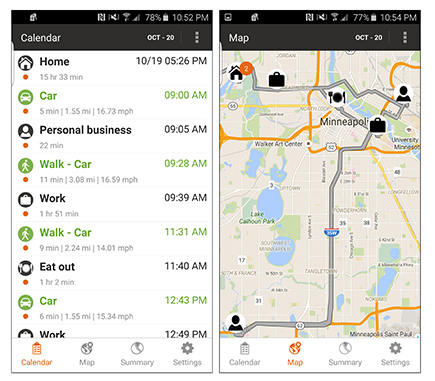Transportation agencies need travel behavior data to plan changes to their networks, systems, and policies. A new smartphone application developed by a University of Minnesota research team makes it easier and less costly to collect this important information and provides richer, more accurate data than traditional methods.
The Daynamica open-source app provides an efficient approach for collecting and processing detailed data regardless of travel mode—driving or walking, biking or taking transit. It combines smartphone GPS sensing with advanced statistical and machine-learning techniques to automatically detect, identify, and summarize attributes of daily activity and travel episodes. The app then allows users to view and annotate information at their convenience.
In contrast, traditional travel survey methods—commonly, paper diaries—are often burdensome to study subjects and increasingly impractical for use, says Yingling Fan, associate professor in the Humphrey School of Public Affairs and the principal investigator for the work.
And while GPS sensing tools can collect data about travel mode, position, and route, they are unable to obtain key dimensions such as trip purpose, travel experience, and travel companionship. “All of these factors are critical for understanding people’s travel choices,” Fan says. “Daynamica gives us the best of both worlds: It captures many more dimensions of travel behavior data than either GPS sensing or travel surveys can alone.”
formats.
Daynamica places a much lower burden on users to recall and record their activities compared with traditional surveys, resulting in more accurate and detailed data. Lower user burden could also allow agencies to lengthen the time studied. “Many traditional surveys track only a single day,” Fan says. “It would be better to collect a whole week of data to see how travel varies between weekdays and weekends. We could also look at seasonal variations and other factors. The more data, the better.”
Unlike other apps, Daynamica hosts both the data obtained from sensors and the data entered by users in a single device and enables interaction between the two data sources in real time. This in turn allows for data calibration and processing refinements over time. “The algorithm learns from past mistakes,” Fan explains. “As it gets smarter, users need to make fewer corrections. After about a week of use, most data collection is automated. It learns what your location is—home, job, day care, or grocery store, for example—and remembers it.”
Daynamica offers several other advantages, Fan says. It is easier to distribute and manage than other technologies because it does not involve providing additional devices or instruments to respondents if they already own a smartphone. Users only need to download the Daynamica app and install it on their phone, and updates can be provided to users quickly and easily. In addition, Daynamica collects data in a way that reduces the need for post-processing, she says, saving time and expense for agencies.
Although currently targeted for agency use only, plans are to form a start-up company to commercialize the app for the general public, says Chris Ghere, technology strategy manager at the U of M’s Office for Technology Commercialization.
Daynamica was developed by a multidisciplinary team including Fan, Assistant Professor Julian Wolfson (School of Public Health), Professor Gediminas Adomavicius (Carlson School of Management), and computer science students Yash Khandelwal and Jie Kang. Daynamica expands on the previous SmarTrAC app developed by the team under contract with the Volpe Center at the U.S. Department of Transportation in support of the Intelligent Transportation Systems Joint Program Office. Funding was also provided by CTS.
For more information, visit the Daynamica website.




